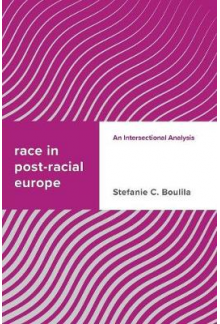- Home
- All Categories
- Academic, Professional Literature
- Social Sciences
- Sociology
- Race in Post-racial Europe. AnIntersectional Analysis
Stefanie C. Boulila
Race in Post-racial Europe. AnIntersectional Analysis
Voted 0
ISBN: 9781786605580
Author : Stefanie C. Boulila
Published: 2019
Publisher: Rowman & Littlefield
Number of pages: 190
Language: English
Format: Paperback
Author : Stefanie C. Boulila
Published: 2019
Publisher: Rowman & Littlefield
Number of pages: 190
Language: English
Format: Paperback
Full price:
29.00 €
- % When buying online
Price:
Whe don't have this product
Delivery in Lithuania within 2-6 weeks
Delivery in Lithuania within 1-4 working days. A few days delay is possible
Delivery in Lithuania within 2-6 weeks
Delivery conditions
Description
Europe is witnessing a new era of racial denial. After decades of anti-racialism, post-feminism and the recognition of some queer lives, the language of equality and diversity suggests that Europe has not only overcome racism but also sexism and homophobia. Racist violence in the wake of the ‘refugee crisis’, Brexit as well as the force of the extreme Right have been blamed on ‘too much diversity’ and ‘false tolerance’ by European leaders and commentators alike. The reiteration that racialized Others are a danger to European liberal gains has become a ‘common-sense’ claim in the call for the securitization of the European borders and ‘tougher rules’ for immigrants and served as the basis for the call to end multiculturalism Race in Post-racial Europe offers an analysis of the intersectional logics of post-racial formations in Europe. With the increasing significance of gender and sexual norms in debates around migration, post-racial formations have yet to be studied in conjunction with the liberal articulation of Europe as post-feminist and post-homophobic. Whether in the campaign for the minaret ban in Switzerland, in Dutch gay rights discourses or in the aftermath of the Cologne events, the New Right has successfully joined forced with some feminist and LGBT voices in the claim that women and queers need to be protected from migrants. In Europe, where race is deeply intertwined with notions of modernity, gender and sexuality have proven particularly relevant sites of racialisation.
Reviews (0)
Write a review

